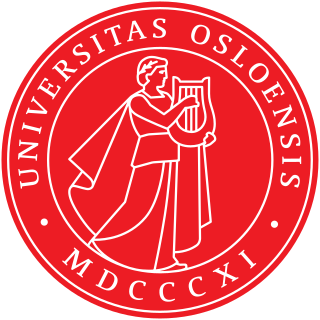Related Research Articles

Social science is one of the branches of science, devoted to the study of societies and the relationships among members within those societies. The term was formerly used to refer to the field of sociology, the original "science of society", established in the 18th century. In addition to sociology, it now encompasses a wide array of academic disciplines, including anthropology, archaeology, economics, geography, linguistics, management, communication studies, psychology, culturology and political science.

The University of Bergen is a public research university in Bergen, Norway. As of 2021, the university had over 4,000 employees and 19,000 students. It was established by an act of parliament in 1946 consolidating several scientific institutions that dated as far back as 1825. It is Norway's second-oldest university, and is considered to be one of the nation’s four so-called "established universities." It has faculties and programmes in all the academic fields typical of a classical university, as well as such degree programmes as medicine and law that, traditionally, only the “established universities” are authorized by law to offer. It is also one of Norway's leading universities in many of the natural sciences, including marine research and climate research. It has consistently been ranked in the top 200 or top one percent of universities in the world, and as one of the best 10 or best 50 universities worldwide in some fields, such as earth and marine sciences. It is part of the Coimbra Group and of the U5 group of Norway's oldest and highest-ranked universities.

The University of Oslo is a public research university located in Oslo, Norway. It is the oldest university in Norway and consistently considered the country's leading university, one of the highest ranked universities in the Nordic countries and one of world's hundred highest ranked universities. Originally named the Royal Frederick University, the university was established in 1811 as the de facto Norwegian continuation of Denmark-Norway's common university, the University of Copenhagen, with which it shares many traditions. It was named for King Frederick VI of Denmark and Norway, and received its current name in 1939. The university was commonly nicknamed "The Royal Frederick's" before the name change, and informally also referred to simply as Universitetet.

The Peace Research Institute Oslo is a private research institution in peace and conflict studies, based in Oslo, Norway, with around 100 employees. It was founded in 1959 by a group of Norwegian researchers led by Johan Galtung, who was also the institute's first director (1959–1969). It publishes the Journal of Peace Research, also founded by Johan Galtung.

MF Norwegian School of Theology, Religion and Society, formerly the Free Faculty of Theology and MF Norwegian School of Theology, is an accredited Norwegian specialized university focused on theology, religion, education and social studies, located in Oslo, Norway. It is one of three private specialized universities in Norway, alongside VID and BI.
The Department of Social and Decision Sciences (SDS) is an interdisciplinary academic department within the Dietrich College of Humanities and Social Sciences at Carnegie Mellon University. The Department of Social and Decision Sciences is headquartered in Porter Hall in Pittsburgh, Pennsylvania and is led by Department Head Gretchen Chapman. SDS is known for research and education programs in decision-making in public policy, economics, management, and the behavioral social sciences.

Yerevan State University, also simply University of Yerevan, is the oldest continuously operating public university in Armenia. Founded in 1919, it is the largest university in the country. It is thus informally known as Armenia's "mother university". Of its 3,150 employees, 1,190 comprise the teaching staff, which includes 25 academicians, 130 professors, 700 docents, and 360 assistant lecturers. The university has 400 researchers, 1,350 post-graduate students, and 8,500 undergraduates, including 300 students from abroad.

The sociology of law, legal sociology, or law and society is often described as a sub-discipline of sociology or an interdisciplinary approach within legal studies. Some see sociology of law as belonging "necessarily" to the field of sociology, but others tend to consider it a field of research caught up between the disciplines of law and sociology. Still others regard it as neither a subdiscipline of sociology nor a branch of legal studies but as a field of research on its own right within the broader social science tradition. Accordingly, it may be described without reference to mainstream sociology as "the systematic, theoretically grounded, empirical study of law as a set of social practices or as an aspect or field of social experience". It has been seen as treating law and justice as fundamental institutions of the basic structure of society mediating "between political and economic interests, between culture and the normative order of society, establishing and maintaining interdependence, and constituting themselves as sources of consensus, coercion and social control".

Erik Grønseth was a Norwegian sociologist, Professor of Sociology at the University of Oslo from 1971 to 1989, and "one of the post-war pioneers of sociology" in Norway. He is regarded as one of the founders of men's studies. Together with Harriet Holter, he is also considered the founder of Norwegian family sociology.
Johan Vilhelm Aubert was an influential Norwegian sociologist. He was a professor at the Faculty of Law, University of Oslo from 1963 to 1971 and at the Department of Sociology from 1971 to 1988. He co-founded the Norwegian Institute for Social Research already in 1950, and has been labelled the "father of Norwegian sociology". In his early life he was a member of the anti-Nazi resistance group XU, and while later involved on the radical wing of the Labour Party, he edited the newspaper Orientering.

Tora Aasland is a Norwegian politician for the Socialist Left Party. She served as the Minister of Research and Higher Education from 18 October 2007 to 23 March 2012. She was a member of the Norwegian Parliament, representing Akershus, from 1985 to 1993. From 1991 to 2013, she served as the County Governor of Rogaland.
The Norwegian Centre for Violence and Traumatic Stress Studies is a research centre in Oslo, Norway, and Norway's national research institution in violence and sexual abuse; disaster management, terrorism, armed conflicts and traumatic stress; and forced migration and refugee health research. It is interdisciplinary and employs experts mainly in psychology, psychiatry, and the social sciences. In addition to carrying out research and related activities, the institute advises the Government of Norway in its areas of expertise and has some official emergency management functions at the national level. NKVTS has 101 employees.

The Faculty of Human, Social, and Political Science at the University of Cambridge was created in 2011 out of a merger of the Faculty of Archaeology and Anthropology and the Faculty of Politics, Psychology, Sociology and International Studies. According to the Cambridge HSPS website: graduates pursue careers in "research, the Civil Service, journalism, management consultancy, museums, conservation and heritage management, national and international NGOs and development agencies, the Law, teaching, publishing, health management, and public relations."
Erik Rinde was a Norwegian jurist who became a pioneer of social sciences in Norway.

The Norwegian Journal of Sociology is a Norwegian, peer-reviewed academic journal within the field of sociology. It is published by Universitetsforlaget on behalf of all the institutes of sociology at Norway's universities, with support from the Research Council of Norway. The journal is the result of the 2016 merger of the journals, Sosiologi i dag, established in 1971, and Sosiologisk tidsskrift, established in 1993, which were both among the then three leading social science journals in Norway; the journal also obtained its present title at the time of the merger. The journal's joint editors-in-chief are Kari Stefansen, May-Len Skilbrei and Arve Hjelseth.

The Faculty of Law of the University of Oslo is Norway's oldest law faculty, established in 1811 as one of the four original faculties of The Royal Frederick University. Alongside the law faculties in Copenhagen, Lund and Uppsala, it is one of Scandinavia's leading institutions of legal education and research. The faculty is the highest-ranked institution of legal education in Norway and is responsible for the professional law degree, one of the most competitive programmes at any Norwegian university. Those admitted to the law programme at the University of Oslo tend to have an average high school grade that is higher than the highest grade, and are usually the best in their class at high school level.

The Dragomanov Ukrainian State University is a Ukrainian higher education institution in Kyiv, which has III-IV accreditation level. It is named after Mykhailo Drahomanov.
May-Len Skilbrei is a Norwegian sociologist, criminologist and gender studies scholar. She is Professor of Criminology at the Department of Criminology and Sociology of Law at the University of Oslo Faculty of Law. She has previously been Managing Director of the Fafo Institute for Applied International Studies. She is editor-in-chief of the journal Sosiologi i dag. She has also been President of the Association for Gender Research in Norway, board member of the European Society of Criminology and board member of the University of Oslo Faculty of Law. She also headed the Research network on prostitution in the Nordic countries. She has been described by Aftenposten as one of Norway's leading experts on prostitution and human trafficking.
References
- ↑ Erling H. Albrechtsen (ed.), 40 år – ingen alder? Festskrift til Instituttet for sosiologi etter 40-årsmarkeringen i 1990 , 1991, ISBN 8257000752
- ↑ Heinz Maus, A Short History of Sociology, p. 192, Routledge, 2014, ISBN 9781317834359